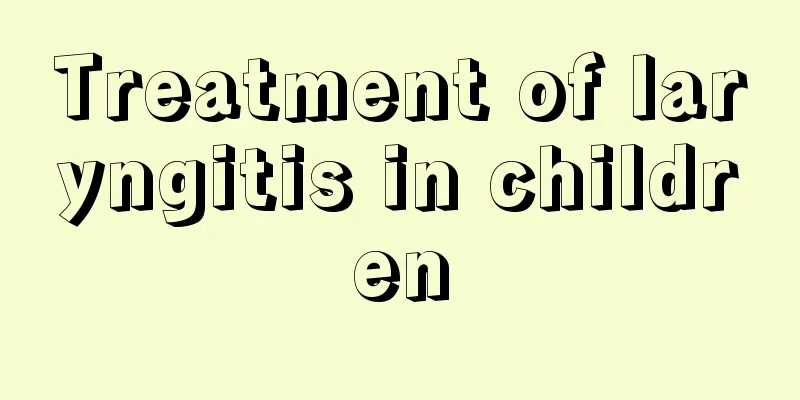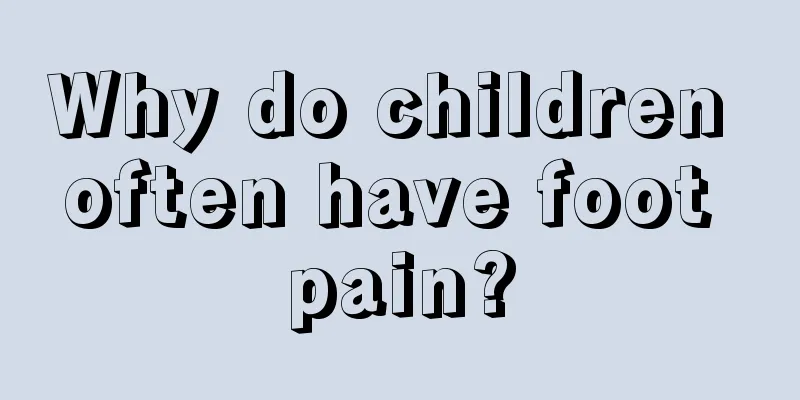Treatment of laryngitis in children

|
Every child is the apple of his or her parents’ eyes. Once the child is not feeling well, the parents will become panic-stricken. We dare not use medicines casually. Children under one year old cannot express their thoughts, and parents can only worry. If childhood laryngitis is not treated in time, it can be life-threatening, so when you hear your child's voice becoming hoarse, you must pay special attention to it. It is every parent's wish for their children to grow up healthily. If the children are still young, there are some small folk remedies that can prevent them from having to drink such bitter medicine. Symptoms of laryngitis in children: Children with laryngitis have sensitive nerves in their larynx, which will go into spasm when stimulated. In addition, their coughing function is not strong, and it is not easy to expel secretions in the trachea of the larynx. This can more easily cause symptoms of dyspnea, such as flaring of the nostrils, lifting of the sternum when inhaling, and an "empty" cough. If not treated promptly, the condition will progress to cyanosis or pallor around the mouth and nose, and cyanosis of the fingers and toes will also occur. Therefore, once parents hear their children have a "hollow" cough, they should take their children to the hospital in time to control the inflammation. Causes: This is mainly due to the low immune function of children. The mucosal tissue in the subglottic area of children is loose and has rich lymphatic vessels. When there is inflammation, the mucosa and submucosa are very prone to edema. In addition, the laryngeal cavity of children is narrow and the laryngeal cartilage support is weak. When subglottic edema occurs, a "hollow, hollow" cough will occur. Children have poor coughing function. The nerves are sensitive and when stimulated, they can easily cause laryngeal spasm and laryngeal obstruction, which seriously affects ventilation and can be life-threatening if not properly treated. Therefore, when a child's voice becomes a little hoarse at the beginning of laryngitis, even if there is no difficulty breathing, it should be taken more seriously than a common cold and treated more actively. Features: ① It is more common in young children, with the highest incidence in infants under 1 year old. The onset time is concentrated between December of the previous year and February of the next year. The vast majority of children have symptoms of upper respiratory tract infection. ② Acute laryngitis occurs when there is hoarseness and dry cough. The cough makes a "kong-kong-kong" sound, like a dog barking. Subsequently, due to the development of edema in the subglottic area, inhalation becomes difficult and accompanied by laryngeal sounds. As the condition gradually worsens, significant inhalation dyspnea may occur. ③ Most children may have fever to varying degrees, but high fever is rare and most have mild to moderate fever. Due to laryngeal obstruction and hypoxia, children are often irritable and refuse to eat. Physical examination may reveal cyanosis of the complexion and three depressions (i.e., significant depressions in the supraclavicular fossa, suprasternal fossa and upper abdomen during inhalation), which are particularly severe at night. ④ Direct laryngeal examination reveals congestion and swelling of the laryngeal mucosa. Treatment The main thing is to actively control the infection and add corticosteroids to quickly reduce laryngeal edema and keep the airway open. At the same time, keep the child quiet, avoid crying and making a fuss, allow the vocal cords to rest, and reduce oxygen consumption. In winter and spring, infants who suddenly become hoarse, cough frequently, and have difficulty breathing at night are often seen in pediatric emergency rooms or ENT emergency rooms. These children generally suffer from acute laryngitis caused by acute upper respiratory tract infection. Therefore, children's laryngitis should be treated promptly, and parents should be alert to children's long-term cough, cold and fever symptoms. Treatment of laryngitis in children should focus on: 1. Get enough rest and drink plenty of water. 2. Pay attention to your condition and go to the hospital immediately if you experience high fever, ear pain, worsening cough, difficulty breathing, drowsiness, etc. 3. Reduce fever. If the body temperature exceeds 38 degrees, use physical methods to reduce it in time, such as wiping the forehead with a warm, wet towel. If the body temperature exceeds 38.5 degrees, you can take antipyretics appropriately. 4. Don’t abuse antibiotics. If there are no complications such as otitis media or pneumonia, antibiotics are not recommended. 6. Traditional Chinese medicines such as Isatis root and Ginseng root; antiviral drugs in Western medicine, such as ribavirin. Precautions: Because laryngitis in children develops rapidly, is severe, and can be life-threatening, preventive measures must be taken. Prevention should start with strengthening children's physical fitness. Families can take the following steps: 1. Insist on outdoor activities to improve your physical fitness. 2. Avoid going to public places during the cold season. 3. Pay attention to weather changes and add or remove clothes in time. 4. Drug prevention. As mentioned above, childhood laryngitis is not serious and can be cured quickly as long as it is detected and treated early. Mothers should pay more attention to their children's every move, wear more clothes and let them drink more water. Take your children out to sunbathe more often to increase their immunity, and keep medicine at home so that children can take medicine if they feel uncomfortable. Being a mother is not easy, and there is a lot to learn with my children. |
<<: Your baby always sticks out his tongue, you should pay attention
>>: Causes of asthmatic bronchitis infection in children
Recommend
Causes and treatment of small red pimples on a 3-year-old baby's face
The baby's skin is very good! If you are not ...
Several physical methods for reducing fever in children
Children's bodies are particularly fragile, s...
What causes high platelet count in children?
What is the reason for thrombocytopenia in childr...
Causes and treatment measures for sudden fever in children
Babies will have fever more or less from childhoo...
Why is the child's tongue yellow?
If parents find that their child's tongue is ...
Baby's skin itchy at night
During the day, because the body is moving, the b...
What are the causes of psychogenic frequent urination?
Psychogenic frequent urination is a relatively in...
Frequency and duration of breastfeeding for newborns
For first-time mothers, the frequency and duratio...
What to do if your baby is allergic to milk
Transitioning means switching your baby from brea...
Blood in the stool in children
With the continuous development of modernization,...
Is it good to drink garlic water when children have a cough?
It is inevitable that children will get sick duri...
What are the factors that cause tear duct obstruction in children?
Tear duct blockage often occurs in children. Tear...
Girls touch here and suffer from gynecological diseases
In our impression, gynecological diseases are dis...
How much milk should a 2 and a half month old baby take?
Newly born babies need careful care from their pa...
Massage techniques for treating indigestion in children
Because they are greedy and some babies eat a lot...









